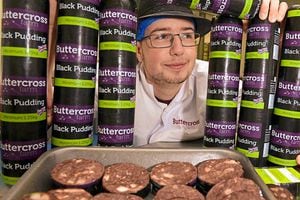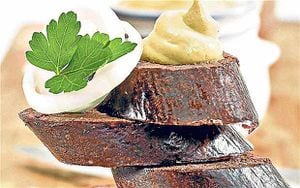Shropshire secrets behind black pudding 'superfood' revival
Love it or hate it – it has become one of 2016's most unlikely new superfoods.

And that is great news for one black pudding manufacturer in Shropshire, where staff are expecting a big jump in orders.
The breakfast staple in many parts of the UK has been listed as one of the foods expected to soar in popularity because of its nutritional benefits.
Loaded with protein, potassium, calcium and magnesium, as well as being practically carb free, it is expected to fly off the shelves.

Black pudding is a type of blood sausage commonly eaten in Great Britain, Ireland and other parts of Europe.
It is generally made from pork fat or beef suet, pork blood and a relatively high proportion of oatmeal, in some recipes mixed with grits (oat groats) and sometimes even barley groats.
Black pudding is often grilled, fried, baked or boiled in its skin. It can be eaten cold as it is cooked in production. It was occasionally flavoured with pennyroyal, differing from continental European versions in its relatively limited range of ingredients and reliance on oatmeal and barley instead of onions or chitterlings to absorb and be mixed with the blood.
In the United Kingdom, black pudding is considered a delicacy in the Black Country, the West Midlands, Stornoway, the North West, and especially in Greater Manchester (in towns such as Bury), where it is traditionally boiled and served with malt vinegar out of paper wrapping.
he Stornoway black pudding, made on the Western Isles of Scotland, has been granted Protected Geographical Indicator of Origin status.
Black puddings are also served sliced and fried or grilled as part of a traditional full breakfast in much of the UK and Ireland, a tradition that followed British and Irish emigrants around the world.
Black pudding is now part of the local cuisine of the Canadian provinces of Nova Scotia and Newfoundland and Labrador.
Source: Wikipedia
It's also rich in iron and zinc – two minerals frequently missing from modern diets.
Sam Rowley, manager of Buttercross Farm, near Market Drayton, said: "We are the only company locally manufacturing black pudding.
"We always knew our black pudding was good, but would never have thought of it being a superfood.
"However, with high levels of protein, iron and zinc, that's exactly what it's being hailed as across the media.
"It's a little bit of a Marmite product. A lot of people won't even try it, but once they do they realise just how good it is.
"Over the past few years it has become significantly more popular, our sales are around three times higher than they were three years ago."
Mr Rowley explained how the Buttercross black pudding was perfected through a mixture of local knowledge and trial and error.
He added: "When Buttercross was in its infancy we employed an incredibly experienced butcher to help us within the industry. However for all his experience he was, shall we say, a slightly eccentric character.
"As we looked to expand our product range he was adamant that black pudding would be our next best seller and he knew just the recipe.
"He went on to describe his time when he was 'just a lad' completing his butchery apprenticeship, and used to be tasked with literally jumping into a huge tub and mixing the pudding ingredients as they came down chutes to him. He told us this was the way that proper black pudding was made.
"We weren't too keen on bringing an apprentice in to swim around in a big black pudding barrel, but we were very interested in making pudding to a very specific traditional recipe, so we got our normal mixer firing and set about trying to decipher our maverick butcher's ramblings about how it was done in the good old days.
"On a cold Monday morning after a few weeks and many a batch of 'nearly but not quite' puddings we were starting to get a bit despondent, until a triumphant butcher flew through the door after a weekend epiphany. He produced a secret recipe that we still use to this day."
The firm has produced more than 18 tonnes of black pudding since they started making it 10 years ago, creating it in sticks, slices and even as an ingredient in sausages for suppliers across the country.
Mr Rowley said: "We get the odd comment from customers that it 'tastes just like it used to' and that really pleases us. And now it is a superfood we hope our customer base will increase."
Darren Beale, from healthy living website MuscleFood.com, said: "Last year saw healthy eating reach a new level and this year we predict this trend is only going to get bigger.
"It's been interesting to note how people are changing their habits depending on the new buzz words in clean eating. Some of the foods have been on the up for a while like avocado oil and maca root – but others like black pudding have been a total surprise.
"It's great to have this new research available to find out the hidden qualities in food and we can't wait to see how these new trends take off."
Meanwhile, ministers have been told black pudding's health benefits should be debated by MPs after it was labelled a superfood.
Conservative David Nuttall insisted the benefits of eating the "tasty delicacy" should be more widely known.
He pressed Commons Leader Chris Grayling to free up time in the chamber to discuss the issue. Mr Nuttall asked Mr Grayling: "Can we please have a debate on the health benefits of eating black pudding?
"You will no doubt have seen reports this week that this tasty delicacy is full of protein, potassium, calcium, magnesium, iron and zinc – so it is not only good for you, it's actually a superfood and a debate will enable us to ensure the benefits are more widely known."
Black pudding joined seaweed, black beans, avocado oil, teff grains and birch water as key superfoods for 2016.





